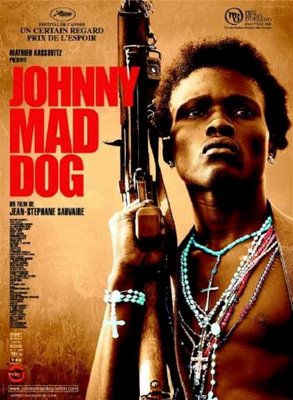
JOHNNY MAD DOG
France/Liberia, 2008, 93 minutes, Colour.
Christopher Minie, Daisy Victoria Vandy.
Directed by Jean- Stefan Sauvaire.
It is quite amazing to read acknowledgements to the president and government of Liberia for a film, especially a film that shows so many ugly faces of war in the troubled conflicts of the 1990s. Yet, here they are – and the film was made on Liberian locations in and around Monrovia. And the cast consisted of former child soldiers who portray the fighting and atrocities they committed in those times.
Director and producers took care in the casting, finding that the re-enactments, as acting, were a kind of therapy. The technical adviser was Joseph who plays the rebel general. He had been a child soldier since the age of ten. Since many of the cast could not read or memorise a script, much of the dialogue is memory and improvised.
The film is a frightening experience in the sense that it shows horrors that are normally unimaginable. The HD photography gives graphic closeups of characters and action and the editing immerses us in terrible events. With the focus on Johnny, and even more frighteningly on the young boy who plays a 13 year old merciless soldier called No Good Advice, we have to ask ourselves how such abductions took place, how the children were brainwashed (nicknames, songs, drugs…) and could attack, abuse and kill as they did. The film is a challenge to conscience and consciousness of the evil dimensions of human nature.
There must be some hope as Liberia has an elected government, the film was made there, and the children are coming to terms with what they have done, but this latter is a desperate and hard road to go.
1.A gruelling experience? The horrifying realities it depicts? The need for healing? Reconciliation? The final credits and the photos?
2.The history of Liberia, 1990s to 2002? Civil war, corrupt president (and later trials), the rebels, the role of the United Nations? The atrocities committed, tribalism?
3.The film having Liberian government backing, filmed in Liberia, with a cast of children who served as soldiers?
4.The rebels – the audience not seeing their cause? Their methods and the repulsion? The tribalism and the attack on the Dogo tribe? The bloodlust and its encouragement? The rebel officers, the abduction of the children, training them, indoctrination, drugs? Nicknames, songs? Rape and violation, cruelty? The arrogance, mercilessness?
5.The opening, the attack, editing and pace, the victims, the child soldiers, the focus on Johnny, on No Good Advice? The general? The language and abusiveness, the arbitrary treatment, despising of the enemy?
6.The character of Mad Dog Johnny, the fact that he had forgotten his real name, no family, soldier at the age of ten, his being commended, the general relying on him, No Good Advice as his subordinate, the other members of the group? Pride and arrogance? Obedient, fulfilling the missions? Walking at the head of the group? His being given the cocaine to stir him up? His relationship with the Dogo girl? The attack, the fight in the city, the mission to take the television station, the achievement? The confrontation with the personnel in the TV station, the arbitrary shootings, the woman who was the announcer, her criticisms of the rebels? The violent sexual treatment?
7.Recouping strength, the indoctrination, the mission, getting the president, taking the city? The advance, Mad Dog Johnny and his leadership, No Good Advice and his being dominant? The shooting at their truck? Finding the boy with the oranges, killing him? The man carrying the pig, being accused of being a looter? The pig being stolen by No Good Advice? His keeping the pig, not wanting others to have it, not wanting it to be killed? The eventual killing of the pig and their all eating the meat?
8.The focus on the young girl, her concern about her legless father? Her brother? The advance of the rebels? Taking her brother, her father refusing to go, leaning against the door? Her hiding in the streets, witnessing the of the boy with the oranges? Coming down the steps, the confrontation with Mad Dog? His letting them go, her return, finding her father wounded? The wheelbarrow, taking him to the hospital? His being in hospital, tended? His death? Her grief, losing her brother, unable to find him? The cyclist and taking him to the cemetery, burying him? Her being a judgment on Mad Dog?
9.In the streets, the fighting, the soldiers, taking the bridge? Radio contact with the general?
10.The aftermath, the killing of the pig, on the beach? Mad Dog and the Dogo girl? The other girl and the clash? The continued shootings?
11.The day after, Mad Dog going to the general, the general and his being in the regular army, becoming a corporal, there not being any money available, telling him that he could go to be a guard at the security camps? The collapse of Mad Dog’s world? A future?
12.The aftermath of the war, the effect on the child soldiers, their lack of morals, morale? The need for reconciliation and retraining?
13.The film and its use of former soldiers, the actor portraying the general having been a boy soldier and giving technical advice? The re-enactments of the events under the control of the director, improvising from their memories as a means of therapy?
14.The impact of this kind of story for the world, what happened in Africa in the 1990s in so many countries, the role of children soldiers? The comment on human nature and the need for world consciousness to better these situations?